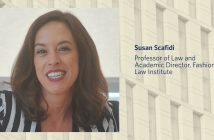In the following abstract of a forthcoming article, Professor Elizabeth Cooper proposes that appearance conformities of lawyers are challenges to self-identity in the The Appearance of Professionalism, 70 Florida L. Rev. ___ (forthcoming 2019)
The dominant image of a lawyer overwhelmingly remains a neatly dressed person wearing a conservative, dark suit, white shirt, and appropriate accessories. Most attorneys can conform to these expectations, but there are a growing number of “outsider lawyers”—including attorneys of color, women, LGBTQ attorneys, and religiously observant attorneys—for whom compliance with appearance norms can be a challenge. African American women may feel pressure to straighten their hair. Lesbians may be unsure if they can wear a pant suit and flat shoes to court. Religious men and women may consider removing their head coverings.
Appearance conformity raises profound issues of autonomy and core identification that go well beyond style preferences. They can also have deep and lasting employment consequences. Psychological research has demonstrated that people make quick judgments that are imbued with unconscious bias. When an outsider law student or new attorney goes on a job interview or starts a new position, the employer cannot help but use this skewed lens. And fast and faulty implicit biases can also create microaggressive environments—places where outsiders are all-too-aware that they do not conform to the dominant culture’s norms and expectations.
To minimize these potential harms, and to facilitate acceptance, some outsiders may choose to “cover,” or find a way to minimize, any differences. But these acts have their own cost, potentially harming the new lawyer’s sense of autonomy and authenticity, her feelings of competence, and her close relationships with others.
This Article argues that legal employers have an obligation to respond to these harms, pursuing cultural proficiency that encourages insider lawyers to be aware of the implicit biases they may hold and the microaggressions they may act out. Law schools have a concomitant responsibility to outsider students to raise and respond to the dominant professional culture, arming students to be true to their sense of autonomy and authenticity. These initiatives are essential to ensuring that law students and lawyers are not judged by their appearances, but rather are assessed by their capacities and the substance of their work. Starting here provides a tangible way to uproot the implicit bias and microaggressions that still pervade our legal institutions. Our profession deserves nothing less.




